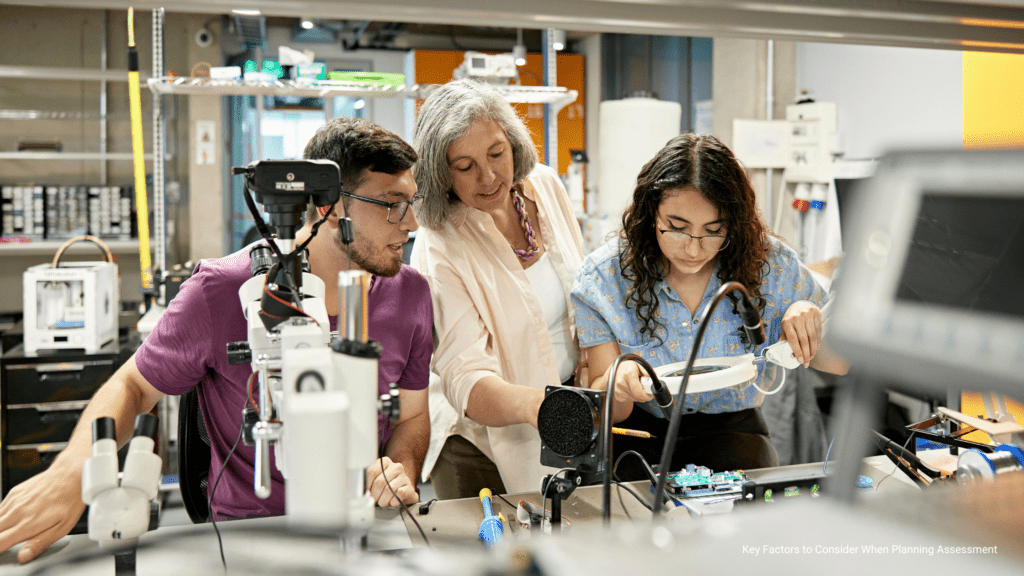Assessment remains a cornerstone of effective learning in education and training. As educators and institutions face the challenge of creating meaningful evaluations, it is essential to understand the key factors that contribute to a well-planned assessment strategy. From establishing clear standards to providing constructive feedback, planning assessments requires careful consideration and a broad approach.
Standards and Criteria: The Foundation of Assessment
At the heart of any assessment are the standards and criteria against which learners will be evaluated. These benchmarks serve as guiding principles for both educators and students, providing a clear understanding of what is expected and how performance will be measured. When establishing these standards, ensure they align with the learning objectives and are achievable and challenging.
Educators must balance setting the bar high enough to encourage development while ensuring it remains within reach to maintain motivation. Furthermore, these criteria should be transparent and easily understood by all stakeholders, including learners, parents, and other educators involved in the process.
Evidence and Assessment Methods: Painting a Complete Picture
The types and volume of evidence required for assessment play a key role in determining the effectiveness of the evaluation. A well-rounded assessment plan should incorporate a variety of evidence types, ranging from written work and practical demonstrations to oral presentations and group projects. This diverse approach allows a more comprehensive evaluation of a learner’s skills and knowledge.
When selecting assessment methods, it is important to consider the nature of the subject matter and the specific learning outcomes being measured. For example, a practical skill may be best assessed through a hands-on demonstration, while theoretical knowledge might be more effectively evaluated through written examinations or research projects.

Communication: The Key to Successful Assessment
Clear and consistent communication is essential throughout the assessment process. Learners should be well-informed about the assessment criteria, methods, and timelines. This transparency not only helps to alleviate anxiety but also empowers students to prepare effectively and take ownership of their learning journey.
Moreover, communication should extend beyond the learner to include all relevant parties, such as other educators, support staff, and external examiners. This collaborative approach ensures everyone involved in the assessment process is aligned and working towards the same goals.
Location and Resources: Setting the Stage for Success
The physical environment in which assessments take place can significantly impact learner performance. When planning assessments, careful consideration must be given to the location, ensuring it is conducive to the specific type of evaluation being conducted. For example, a quiet, distraction-free space may be essential for written examinations, while a well-equipped laboratory might be necessary for practical scientific assessments.
Equally important is the availability of necessary resources. This includes not only physical materials and equipment but also digital resources and technologies that may be required for certain types of assessments. Ensuring all learners have equal access to these resources is essential for maintaining fairness and equity in the assessment process.
Time and Duration: Balancing Rigour and Practicality
The timing and duration of assessments are critical factors that can significantly influence learner performance. When planning the assessment schedule, it is essential to consider the overall academic calendar, avoiding conflicts with other major events or assessments that could overwhelm students.
The duration of each assessment should be carefully calibrated to allow sufficient time for learners to demonstrate their knowledge and skills fully without inducing undue stress or fatigue. It is also worth considering the potential need for breaks during longer assessments, particularly for learners with specific needs or accommodations.
Learner Support: Addressing Individual Needs
Every learner is unique, and a well-planned assessment strategy must account for individual needs and provide appropriate support where necessary. This may include accommodations for learners with disabilities, such as extra time, alternative formats, or assistive technologies. It is essential to identify these needs early in the planning process and work collaboratively with learners, support staff, and other relevant professionals to ensure appropriate measures are in place.
Managing the Assessment Process: Ensuring Smooth Execution
Effective management of the assessment process is important for its success. This involves coordinating various elements, including scheduling, resource allocation, and personnel management. Clear protocols should be established for administering assessments, handling unexpected situations, and maintaining security and integrity.
It is also important to have contingency plans to address potential disruptions or challenges during the assessment period. This proactive approach helps ensure the assessment can proceed smoothly, even in unforeseen circumstances.
Recording and Decision-Making: Maintaining Transparency and Fairness
Accurate and comprehensive recording of assessment processes and decisions is essential for maintaining transparency and fairness. This includes documenting the rationale behind assessment choices, any adjustments made to accommodate individual needs, and the specific criteria used for evaluation.
Clear procedures should be in place for making assessment decisions, including processes for moderation and verification where appropriate. This helps to ensure consistency and reliability in the assessment outcomes and provides a solid foundation for any potential appeals or reviews.
Feedback: Closing the Learning Loop
Providing timely and constructive feedback is an important component of the assessment process. Well-planned feedback mechanisms can significantly enhance learning outcomes by helping learners understand their strengths and areas for improvement. Feedback should be specific, actionable, and aligned with the assessment criteria.
Consider incorporating various feedback methods, such as written comments, one-on-one discussions, or peer feedback sessions. The timing of feedback delivery is also important, with prompt feedback generally being more effective in supporting ongoing learning and improvement.
Compliance with Assessment Strategies: Ensuring Validity and Recognition
Complying with the relevant assessment strategy is essential for assessments related to qualifications. This ensures that the assessment meets industry standards and regulatory requirements, maintaining the validity and recognition of the qualification.
It is essential to familiarise oneself with the specific guidelines and requirements of the awarding body or regulatory authority. This may include adhering to prescribed assessment methods, using standardised marking schemes, or following specific quality assurance processes.
In conclusion, planning effective assessments requires a broad approach that considers a wide range of factors. By carefully addressing these elements, educators can create assessment strategies that accurately measure learner progress and contribute positively to the learning experience. As the educational landscape continues to evolve, so must our approaches to assessment, always striving to balance rigour with fairness, and challenge with support.






